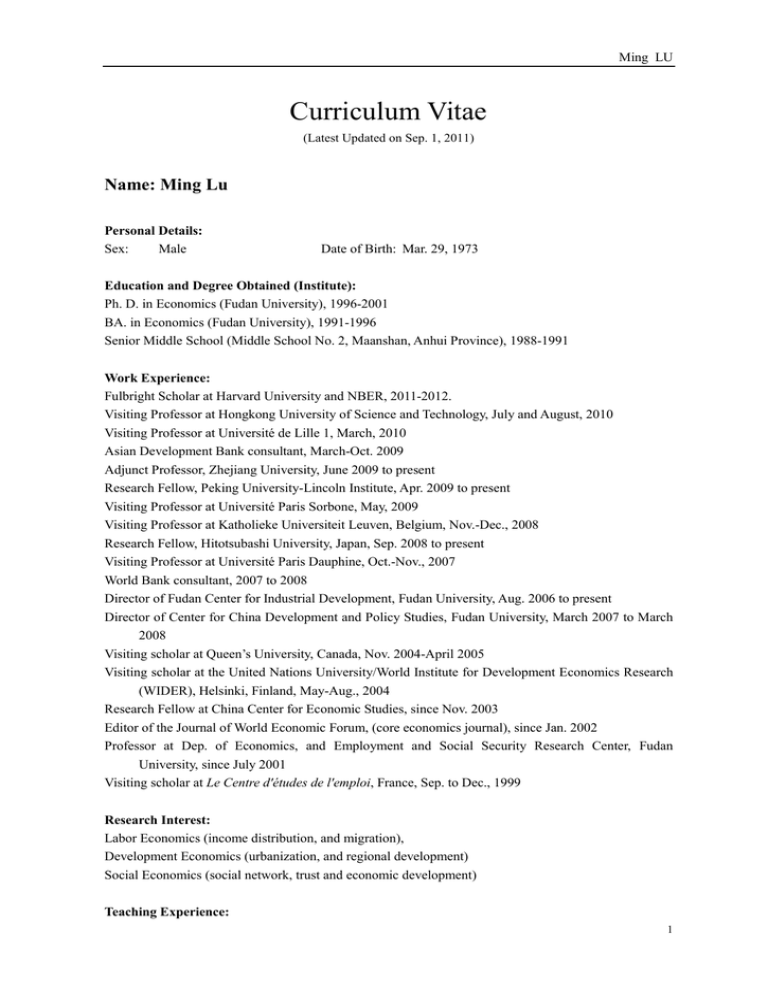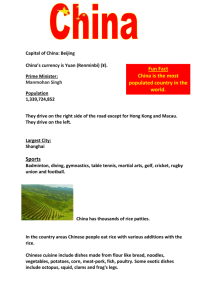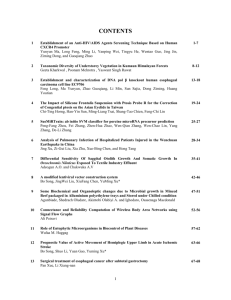Curriculum Vitae
advertisement

Ming LU Curriculum Vitae (Latest Updated on Sep. 1, 2011) Name: Ming Lu Personal Details: Sex: Male Date of Birth: Mar. 29, 1973 Education and Degree Obtained (Institute): Ph. D. in Economics (Fudan University), 1996-2001 BA. in Economics (Fudan University), 1991-1996 Senior Middle School (Middle School No. 2, Maanshan, Anhui Province), 1988-1991 Work Experience: Fulbright Scholar at Harvard University and NBER, 2011-2012. Visiting Professor at Hongkong University of Science and Technology, July and August, 2010 Visiting Professor at Universitéde Lille 1, March, 2010 Asian Development Bank consultant, March-Oct. 2009 Adjunct Professor, Zhejiang University, June 2009 to present Research Fellow, Peking University-Lincoln Institute, Apr. 2009 to present Visiting Professor at UniversitéParis Sorbone, May, 2009 Visiting Professor at Katholieke Universiteit Leuven, Belgium, Nov.-Dec., 2008 Research Fellow, Hitotsubashi University, Japan, Sep. 2008 to present Visiting Professor at UniversitéParis Dauphine, Oct.-Nov., 2007 World Bank consultant, 2007 to 2008 Director of Fudan Center for Industrial Development, Fudan University, Aug. 2006 to present Director of Center for China Development and Policy Studies, Fudan University, March 2007 to March 2008 Visiting scholar at Queen’s University, Canada, Nov. 2004-April 2005 Visiting scholar at the United Nations University/World Institute for Development Economics Research (WIDER), Helsinki, Finland, May-Aug., 2004 Research Fellow at China Center for Economic Studies, since Nov. 2003 Editor of the Journal of World Economic Forum, (core economics journal), since Jan. 2002 Professor at Dep. of Economics, and Employment and Social Security Research Center, Fudan University, since July 2001 Visiting scholar at Le Centre d'études de l'emploi, France, Sep. to Dec., 1999 Research Interest: Labor Economics (income distribution, and migration), Development Economics (urbanization, and regional development) Social Economics (social network, trust and economic development) Teaching Experience: 1 Ming LU Labor Economics (for undergraduates and graduates) Applied Micro-Econometrics (for graduates) Topics in Chinese Economy (in English) Books (in Chinese): 2011, China’s Regional Development: Review and Prospect, (eds. With Zhao Chen, Xiwei Zhu and Xianxiang Xu), Shanghai People’s Press and Gezhi Press. 2010, Chinese Economy at the Crossroad, CITIC Publishing Group. 2009, Political Connection: Entrepreneurs and the Development of Private Enterprises, (with Hui Pan), Peking University Press. 2009, Toward Balanced Growth with Economic Agglomeration: Empirical Studies of China’s Urban-Rural and Interregional Development, (with Zhao Chen), Peking University Press. 2008, China’s Economic Development Path, (with Zhao Chen, Yongqin Wang, Yan Zhang, Yuan Zhang, and Changyuan Luo), China Dabaike Publishing House. (ISBN 978-7-5000-7892-0) 2008, Microeconomics, (with Zhao Chen), Higher Education Press. (ISBN 978-7-04-022431-3) 2007, Economics of Labor and Human Resources: Economic Institution and Public Policy, Century Publishing Group and Shanghai People Press.(ISBN978-7-208-07125-4) 2006, The Development Path of China: Voices from Economists, (with Yongqin Wang, Yan Zhang, Yuan Zhang, and Zhao Chen), Shanghai People’s Press. 2006, Market Integration and Industrial Agglomeration in China’s Regional Development, (with Zhao Chen), Shanghai People’s Press. 2004, Wage and Employment Bargaining: A Study on the Efficiency of China's Dual Employment System, Shanghai People’s Press. 2003, The Adjustment of China’s Ownership Structure: Theory and Evidence, (with Zhao Chen), Shanxi Economic Publishing House. 2002, Labor Economics, A Perspective of Modern Economic System, Fudan University Press. 1998, On Disguised Unemployment, (with Zhigang Yuan), Lixin Accounting Publishing House. Journal Papers: Referee Journal papers 2012, “Identity, Inequality, and Happiness: Evidence from Urban China,” (with Shiqing Jiang, and Hiroshi Sato), World Development, forthcoming. 2011, “Labour Market Transition, Income Inequality and Economic Growth in China,” (with Hong Gao), International Labour Review, 150: 101–126. 2009, “Power as a Driving Force of Inequality in China: How Do Party Membership and Social Networks Affect Pay in Different Ownership Sectors?” (with Shuang Li and Hiroshi Sato), CESifo Economic Studies, doi:10.1093/cesifo/ifp016 2008, “Power and Political Participation of Entrepreneurs: Evidence from Liuzhou, Guangxi, China,” (with Zhao Chen, and Junzhi He), Journal of Asia Pacific Economy, 13(3), 298-312. 2007, “Informal Employment in India and China,” The Indian Journal of Labour Economics, (with Jeemol Unni), Vol. 50, No. 3, 531-540. ISSN (printed): 0019-5308 2007, “Globalization and Regional Income Inequality: Empirical Evidence from within China,” (with Guanghua Wan and Zhao Chen), Review of Income and Wealth, 53, 1, 35-59. 2006, “The Inequality-Growth Nexus in the Short- and Long- Run: Empirical Evidence from China,” (with Guanghua Wan and Zhao Chen), Journal of Comparative Economics, Vol. 34, No. 4, 2 Ming LU 654-667. 2006, “Urbanization, Urban-Biased Policies and Urban-Rural Inequality in China: 1987-2001,” (with Zhao Chen), Chinese Economy, vol. 39, no. 3, 42-63. 2002, “Employment Restructuring during China’s Economic Transition”, (with Jianyong Fan, Shejian Liu,and Yan Yan), Monthly Labor Review, August, 25-31. Book chapters and other English and French publications: 2011, “Inter-Industry Inequality: An Important Source of the Urban Income Gap,” (with Zhao Chen and Guanghua Wan), Social Sciences in China, May, 159-177. 2009, “The Costs and Benefits of Federalism, Chinese Style,” (with Yongqin Wang, Yan Zhang, Yuan Zhang and Zhao Chen), in Arthur Sweetman and Jun Zhang (ed.), Economic Transitions with Chinese Characteristics, Thirty Years of Reform and Opening Up, MaGill-Queen’s University Press, 141-159. 2008, “Economic Opening and Industrial Agglomeration in China,” (with Zhao Chen and Yu Jin), in M. Fujita, S. Kumagai and K. Nishikimi (eds.), Economic Integration in East Asia, Perspectives from Spatial and Neoclassical Economics, Edward Elgar Publishing, 276-315. 2008, “Is China Sacrificing Growth when Balancing Interregional and Urban-Rural Development?” (with Zhao Chen), in Yukon Huang and Alessandro Magnoli Bocchi (eds.), Reshaping Economic Geography in East Asia, The World Bank, 241-257. 2008, “Labor Market Reform, Income Inequality and Economic Growth in China,” (with Shiqing Jiang), China & World Economy, Vol. 16, No. 6, 63-80. 2008, “Paying for the Dream of Public Ownership: Case Studies on Corruption and Privatization in China,” (with Zhao Chen and Shuang Zhang), Transition Studies Review, 15: 355-373. 2007, “Globalization and Regional Income Inequality: Empirical Evidence from within China,” (with Guanghua Wan, Ming Lu and Zhao Chen), in Guanghua Wan (ed.), Understanding Inequality and Poverty in China: Methods and Applications, Palgrave Macmillan. 2007, “Economic Opening and Domestic Market Integration,” (with Min Chen, Qihan Gui, and Zhao Chen), in Ross Garnaut and Ligang Song (eds.), China: Linking Markets for Growth, Asia Pacific Press, 369-393. 2007, “Are Equity and Efficiency Irreconcilable Goals in Education? A General Equilibrium Analysis of Basic Education Finance in China,” (with Weili Ding), Frontiers of Education in China, 2(2): 163-180. 2006, “Reform, Interaction of Policies, and Economic Growth: Evidence from China’s Provincial Panel Data,” (with Zhao Chen, and Ji Yan), Frontiers of Economics in China, 1, 48-68. 2004, “The Effects of Migration on Interregional Differentials in Consumer Behavior: Evidence from Baise District, Guangxi, China,” (with Zhao Chen and Hui Pan), The Icfaian Journal of Management Research, Vol. III, No. 9, 7-25. 2004, “Increasing Returns, Development Strategy and Regional Economic Segmentation,” (with Zhao Chen and Ji Yan), The Studies in Regional Development, 36(1), 275-306. 2001, “Employment Trends in Shanghai: A Case of China’s Institutional and Economic Restructuring,” China Perspectives, September – October 2001, P. 13-22. (French version, “Les évolutions récentes de l’emploi à Shanghai,” Perspectives chinoises, juillet – août 2001, P. 14-24.) 2000, “La réforme du système d'emploi,” (with Zhao Chen), Problèmes économiques, La documentation Française, mercredi 16 août 2000. 3 Ming LU Chinese publications (in top 5 journals): 2010, “Inter-industrial Inequality: An Increasingly Important Contributor to Urban Inequality,” (in Chinese, with Zhao Chen and Guanghua Wan), Social Science in China, No. 3, 65-76. 2009, “The Contribution of Guanxi to Income Inequality in Rural China and a Cross-Regional Comparison: a Regression-Based Decomposition,” (in Chinese, with Jianzhi Zhao), China Economic Quarterly, Vol. 9, No. 1, 363-390. 2009, “Who Entered Overpaid Industries? The role of Social Network, Hukou and Labor Productivities,” (in Chinese, with Zhao Chen and Hiroshi Sato), Economic Research Journal, No. 10, 121-132. 2009, “Hukou, Social Segmentation and Trust, An Empirical Study from Changhai,” (in Chinese, with Hui Wang and Zhao Chen), World Economy, No. 10, 81-96. 2009, “Fragmented Growth: Why Economic Opening May Worsen Domestic Market Segmentation?” (in Chinese, with Zhao Chen), Economic Research Journal, No. 3, 42-52. 2008, “How Loosening One-Child Policy Affects Economic Growth: A Theory Based on Family Aging Support,” (in Chinese, with Yongping Liu), China Economic Quarterly, Vol. 7, No. 4, 1271-1300. 2008, “Government Intervention and Entrepreneurs’ Happiness: Empirical Evidence from Liuzhou, Guangxi, China,” (in Chinese, with Yilin Wang, Hui Pan, and Zhenzhen Yang), Management World, No. 7, 116-125, 159. 2008, “Public Trust and Labor Migration in Rural China,” (in Chinese, with Shuang Zhang), World Economic Papers, No.4 77-87. 2008, “From Segmentation to Integration: Political Economy of Urban-Rural Economic Development and Social Harmony,” (in Chinese, with Zhao Chen), Economic Research Journal, No. 1, 21-32. 2008, “Observed Unemployment or Unobserved Employment? Evidence from Shanghai Survey Data,” (in Chinese, with Shichao Tian), Management World, No. 1, 48-56. 2008, “Can Chinese Economic Growth Be Sustainable? An Analysis Based on Family Aging Support,” (in Chinese, with Yongping Liu), World Economy, No. 1, 65-77. 2007, “Restructuring the Triangle: Labor Market Reform, Income Inequality and Economic Growth,” (in Chinese, with Shiqin Jiang), Management World, No. 6, 14-22. 2007, “Sorting: A Literature Review of Non-Market Interaction and Sorting,” (in Chinese, with Shuang Zhang), China Economic Quarterly, Vol. 6, No. 3, 991-1020. 2007, “Equality and Efficiency Hand in Hand: A Model of Strategic Labor Division with Increasing Returns,” (in Chinese, with Shuang Zhang), China Economic Quarterly, Vol. 6, No. 2,443-468. 2007, “Does the Effect of Social Capital on Poverty Reduction Fall or Rise during Marketization? ── Evidence from Rural China,” (in Chinese, with Shuang Zhang and Yuan Zhang), China Economic Quarterly, Vol. 6, No. 2, 539-560. 2007, “Rethinking the Rethinking of Marketization Reform of Education: The Theory and Policy of Efficiently Utilizing Education Resources,” (in Chinese, with Shiqin Jiang), World Economy, No 5, 44-51. 2007, “China’s Big Country Development Path: the Benefits and Costs of Decentralization Reform,” (in Chinese, with Yongqin Wang, Yan Zhang, Yuan Zhang, and Zhao Chen), Economic Research Journal, No. 1, 4-16. 2006, “Chinese Economy at the Crossroad: An Analysis Based on Economics Literature,” (in Chinese, with Yongqin Wang, Yan Zhang, Yuan Zhang, and Zhao Chen), World Economy, No. 10, 3-20. 2006, “Industrial Agglomeration: Economic Geography, New Economic Geography and Economic Policy,” (in Chinese, with Yu Jin and Zhao Chen), Economic Research Journal, No. 4, 79-89. 4 Ming LU 2006, “Is China’s Domestic Goods Market Being Segmented or Integrated? An Analysis Based on Relative Prices,” (in Chinese, with Qihan Gui, Min Chen and Zhao Chen), World Economy, No. 2, 20-30. 2005, “Equality for the Sake of Growth: The Nexus of Inequality, Investment, Education and Growth in China,” (in Chinese, with Zhao Chen and Guanghua Wan), Economic Research Journal, No. 12., 4-14. 2005, “Can Educational Equity and Efficiency Both Be Achieved? A General Equilibrium Analysis of Basic Education Finance,” (in Chinese, with Weili Ding), Social Science in China, No. 6, 47-57. 2005, “Anticorruption, Market Construction and Economic Growth,” (in Chinese, with Gang Sun and Jipeng Zhang), China Economic Quarterly, Vol. 4, Supplementary issue, 1-22. 2005, “Globalization and Regional Inequality, Evidence from China,” (in Chinese, with Guanghua Wan and Zhao Chen), Social Science in China, No. 3, 17-26. 2005, “Reform, Interaction of Policies and Economic Growth: Evidence Based on Chinese Provincial Panel Data,” (in Chinese, with Zhao Chen and Ji Yan), World Economic Papers, No. 1, 27-46. 2004, “A Dynamic Intra-Household Labor Division Theory with Divorce and An Insurance Improving the Efficiency of Labor Division,” (in Chinese, with Zhao Chen and Guiying Wu), China Economic Quarterly, Supplementary issue, 25-31. 2004, “Urbanization, Urban-Biased Economic Policies and Urban-Rural Inequality,” (in Chinese, with Zhao Chen), Economic Research Journal, No. 6, 50-58. 2004, “Increasing Returns, Development Strategy and Regional Economic Segmentation,” (in Chinese, with Zhao Chen and Ji Yan), Economic Research Journal, No. 1, 54-63. 2003, “Why Does the Reform have not Improved SOEs’ Relative Productivity?” (in Chinese), China Economic Quarterly, Vol.2, No. 4, 833-856. 1998, “Gradualist Measures during the Employment System Reform,” (in Chinese, with Zhao Chen), Economic Research Journal, No. 11. 1997, “Disequilibrium Theory and Its Application to Chinese Economy,” (in Chinese, with Yin Fang), Economic Research Journal, No. 8. Selected Research Grants: “Key Indicators for Asia and the Pacific 2011,” Asian Development Bank, 2011-2012. “China’s Transition of Its Dual Economy with a Perspective of Institutional Change,” Key Project of National Social Science Funds, 2012-2016. “China’s Urbanization for Both Efficiency and Equity: Motivation, Path and Policy,” Key Project of National Natural Science Funds, 2012-2016. “Interregional Reallocation of Non-agricultural Land Use Rights and Regional Development,” Ministry of Education Project, 2011-2012. “China’s Urban System,” Shanghai Shuguang Foundation, 2010. “Labor Market Reform, Income Inequality and Economic Growth,” Asian Development Bank Institute, 2009. “Land Use Efficiency and Interregional Land Allocation: An Evaluation Based on China City Level Panel Data (1993-2006),” Lincoln Institute for Land Studies, Peking University, 2008-2009. “Reform, Development, Stability, Harmony and Their Interaction during the Reform,” Ministry of Education Project of China’s 30 Year Development, 2008. “How Does Social Capital Help Households against Negative Shock during Marketization? Evidence from Rural China,” The IDRC/CIGI Young China Scholars Poverty Research Network, 5 Ming LU 2007-2008. “Is China Sacrificing Growth when Balancing Urban-Rural and Interregional Development?” ,World Bank, 2007-2008. “Harmonious Urban-Rural and Regional Development: Theory, Empirics and Policy,” National Social Science Funds, 2007-2009. “China’s Big Country Development Path: the Political Economy of Social Harmony and Economic Growth,” Project for “New Century Distinguished Scholars” from Ministry of Education, 2007-2009. “Chinese Entrepreneur and Development of Private Enterprises,” Key Project Funding from Ministry of Education, 2007-2009. “Macro and Micro Analysis of Income Inequality,” Shanghai Association of Labor and Social Security Studies, 2006. “Regional Development in China: Geography and Policy,” Project Funding from Ministry of Education for authors of Distinguished Ph. D. Thesis, 2005-2009. “The Effects of Urban-Rural Inequality on Economic Growth,” Shanghai Department of Education, 2006-2007. “Asian Regional Economic Integration from the Point of View of Spatial Economics: the Case from China,” granted by Institute of Developing Economies, Japan External Trade Organization, Japan, 2005-2006. “New Way to Shanghai’s Full Employment,” granted by Shanghai Philosophy and Social Science Funds, 2004-2005. “Empirical Study on Employment, Unemployment and Income Distribution in Shanghai,” granted by Shanghai Philosophy and Social Science Funds, 2003-2005. “Strategic Labor Division Theory and Application,” granted by Fudan Social Science Funds, 2003-2005. “Labor Economics,” granted by the 10th 5-Year Textbook Projects, Ministry of Education, 2002-2003. “China’s Employment System Reform: Bargaining Theory and Application,” granted by Shanghai Philosophy and Social Science Funds, 1999-2001. Honors: First Prize of the World Association of Chinese Real Estate Research, 2011. Third Prize of Shanghai Auto Education Foundation, 2011 Top Ten Youth Economic Leaders of Shanghai, 2010. Shanghai Philosophy and Social Science Award, first prize, (Awarded bi-annually for highest achievement in social science research in Shanghai), 2010. Shanghai Leading Scholar, 2009. Prize of Distinguished Social Scientist of Shanghai, 2009. Distinguished Faculty, Fudan University, 2009. Prize of Distinguished Achievements of Chinese Universities (Awarded by the Ministry of Education), 2009. Prize of Shanghai’s Sixth Honor in Research of Deng Xiaopin Theory (Awarded bi-annually for highest achievement in social science research in Shanghai), 2008. Distinguished Paper Prize, (awarded by Shanghai Association of Labor and Social Security Study), 2007. “New Century Talent”, (awarded by the Ministry of Education), 2006. Shanghai Philosophy and Social Science Award, first prize, (Awarded bi-annually for highest 6 Ming LU achievement in social science research in Shanghai), 2006. Prize of Shanghai’s Fifth Honor in Research of Deng Xiaopin Theory (Awarded bi-annually for highest achievement in social science research in Shanghai), 2006. Prize of Distinguished Achievements of Chinese Universities (Awarded by the Ministry of Education), 2006. Shanghai Shuguang Scholar, 2005. Distinguished Research Prize of Personnel Study (Awarded by the Ministry of Personnel), 2004. National Prize for Distinguished Ph.D. Dissertation (Theoretical Economics) (Awarded annually for 1 or 2 in economics), 2004. Shanghai Philosophy and Social Science Award (Awarded bi-annually for highest achievement in social science research in Shanghai), 2004. Shanghai Distinguished Higher Education Textbook Prize, 2004. Fuhua Prize for Social Science Research (Awarded annually for highest achievement in social science research at Fudan University), 2003. New Century Star Prize at Fudan University (Awarded annually to distinguished faculty under 35), 2002. Prize of Shanghai’s Fourth Honor in Research of Deng Xiaopin Theory (Awarded bi-annually for highest achievement in social science research in Shanghai), 2002. Jiang Xuemo Fellowship, 2000. First Prize of Chinese Association of Labor Research (one of the best honors for labour studies in China), 1999. Address: Dep. of Economics, Fudan University, 220 Handan Road, Shanghai 200433, P. R. China Tel: 86-21-55665308 Fax: 86-21-65647719 E-mail: lm@fudan.edu.cn; lumingfd@gmail.com 7


